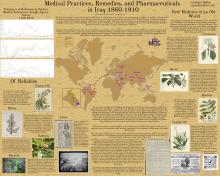The Svoboda Diaries Project (SDP) is a collaborative research and publication effort revolving around the diaries of Joseph Svoboda, an officer in the Lynch Company working on a British steamship on the Tigris River in 19th-Century Iraq. Today, the SDP has expanded beyond just digitalization and transcription of the diaries, into a now very diverse team consisting of experienced researchers, undergraduate interns, and graduate research assistants. SDP members use these diaries as the basis for multiple research projects that span a variety of disciplines. In this post, we offer summaries of current undergraduate research projects being conducted by members of the SDP and presented in the UW Undergraduate Research Symposium.
Medical Practices, Remedies, and Pharmaceuticals in Iraq in 1860-1910
In his diaries, Joseph Svoboda tells the story of his own health troubles, the ailments of those around him, as well as his use of medicinal remedies, including those herbal, homeopathic, and pharmaceutical in nature. Graham Mullen employs these diaries as inspiration to investigate the use of medicinal remedies in Iraq during this period, particularly the use of herbal medicines, drinks, as well as non-herbal remedies. The goal of Graham’s research is to enhance our current understanding of the diffusion of the knowledge of medicine as well as how trade impacted access to material remedies.
Exploring How Area of Study Influences Conceptualization and Interaction with Digital Humanities Tools
The research of Peter Corroon and Xinyue Yu uses the Svoboda Diaries Project in order to assess how students from varying academic backgrounds think and learn on a conceptual level and analyze how this influences their interactions with a digital humanities resource. Peter and Xinyue are conducting an interview study utilizing the methods of concept mapping and the think-aloud protocol to examine how students from diverse academic backgrounds interact with the SDP resources, apply them to their field of study, and characterize how they think conceptually. The goal of their research is to improve the website, gain insights for enhancement of the digital humanities resources, and contribute to generalizable knowledge regarding facilitated learning with digital tools.
Named-Entity Recognition and Geolocation in Ottoman Iraq using the Svoboda Diaries
Jolie Zhou and Rachel Hu use Svoboda’s diaries to learn about the landscape of Ottoman Iraq in the late 19th century. To do this, Jolie and Rachel use automated textual analysis methods to extract location names from the diaries. Then they seek to identify geographic coordinates for these locations. For locations that are not easily found in present-day geographic datasets, they intend to use the textual context in the diaries to infer the geographic coordinates of these places. This research uses the Svoboda diaries to explore how geolocation can be performed on less examined historical regions. The goal of this research is to expand on existing methods in researching historical landscape change, and develop a process that can be applied to other digital humanities projects that analyze primary historical documents.
Digitizing the Svoboda Diaries: A Case Study in Editing, Proofing, and Preserving Primary Sources
This project outlines the work of the content team, which consists of members Xinyue Yu, Yasmine Shubber, Mara Amole, Aybala Turkarslan, and Mackenna Page. This team has been editing and digitizing the Svoboda Diaries following a detailed pipeline that consists of six steps: digitization, transcription, editing, Arabic translations, final proofing, and publishing. The team has transcribed the scanned diary pages line by line, proofread one another’s work, and developed a framework of proofreading in order to identify and indicate illegible and damaged portions of the diaries. The team’s work contributes to literature about accurately preserving and making accessible primary documents and provides guidelines to navigate the ambiguities of editing and witten historical texts.
Conclusion
The Svoboda Diaries Project harbors diverse research opportunities across multiple fields with the opportunity for interdisciplinary collaboration. For more information about our research, the project overall, or to join or collaborate, please visit our website https://svobodadiariesproject.org/ or contact the project co-directors, Drs. Selim Kuru and Annie T. Chen.
